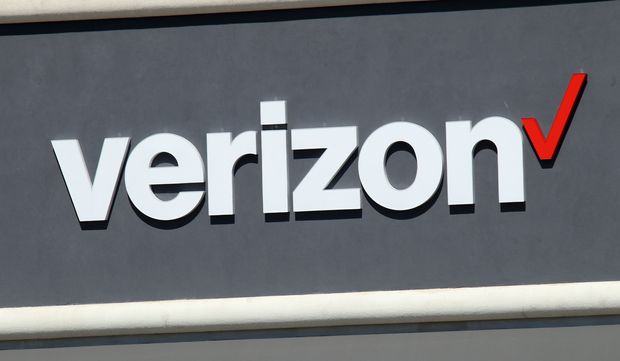
Verizon could be a big spender in an upcoming spectrum auction.
Getty Images
Despite many moving parts in the U.S. wireless industry, Verizon Communications Inc.’s stock now looks attractive, according to one analyst.
MoffettNathanson’s Craig Moffett upgraded the stock to buy from neutral Wednesday, arguing that the company seems to be doing a good job of moving customers over to higher-priced wireless plans, while its shares trade at an “unprecedented discount to the S&P 500.” SPX, -0.02%
Verizon shares VZ, +0.92% are up 0.8% in Wednesday morning trading, putting them on track for the highest close of 2020.
The wireless industry is in the midst of a shakeup, with the arrival of 5G phones from Apple Inc. AAPL, -0.37% and others, as well as the recent merger T-Mobile US Inc. TMUS, -0.06% and Sprint. After a period of muted promotional intensity in the industry, Apple’s iPhone 12 launch looked to spur heavier discounting, a trend that sparked concerns about wireless margins. But Moffett isn’t as concerned about this dynamic as he once was, and he sees a number of other factors swinging in Verizon’s favor.
“To be sure, the upside we see here is not dramatic,” he wrote, while upping his price target to $66 from $59. “But with an attractive – and apparently safe – dividend yield in a yield-starved market, we believe Verizon’s total return prospects are sufficient to warrant our more constructive outlook.”
Verizon last paid a quarterly dividend of 62.75 cents a share in October. At current share prices, that implies a dividend yield of 4.11%, which compares with the yield on the SPDR Communication Services Select Sector exchange-traded fund XLC, +0.50% of 0.70% and the implied yield for the S&P 500 index SPX, -0.02% of 1.56%, according to FactSet. The yield on the 10-year Treasury note TMUBMUSD10Y, 0.955% is 0.96%.
In terms of competitive dynamics, Moffett was encouraged that carriers’ Black Friday offers were “no richer” than they were last year, suggesting that the “the ‘things are getting worse’ narrative may be wrong.” He also sees Verizon as particularly well positioned to capitalize on what’s expected to be an industry-wide lift in average revenue per user (ARPU).
Verizon’s ARPU has come under pressure during the pandemic, as a decline in travel means that fewer customers are racking up international roaming charges. Even if travel is slow to recover, Moffett sees a better setup ahead for Verizon come the second quarter, when the company’s numbers will no longer be compared with year-earlier figures from times when travel trends were normal.
In addition, Moffett expects Verizon to benefit in the current quarter from the expiration of one-year free trials of Walt Disney Co.’s DIS, +1.45% Disney+ service that the carrier began offering late last year. Customers who want to keep the Disney+ service will start being billed for it and Verizon should see incremental revenue as some customers will opt to upgrade to premium unlimited plans that include the service.
Moffett estimates that 7.5 million postpaid accounts will exit their free-trial periods, with 15% choosing to upgrade to premium unlimited plans and 25% paying $6.99 to keep Disney+ without upgrading. He pegs the cost of service for Disney+ at about $5 for Verizon, though the amount hasn’t been disclosed by the company.
Don’t miss: Palantir’s stock pummeled after Morgan Stanley recommends selling
Subscriber dynamics will be worth watching as the 5G wave heats up, and Moffett expects that Verizon could lose share to a mightier T-Mobile, which should have stronger network positioning thanks to spectrum it obtained through the Sprint acquisition. Verizon will be playing a bit of catch up in the 5G race, having bet big thus far on millimeter-wave spectrum, which is best suited for dense urban areas. A big test for the company comes during the imminent C-Band auction, which will allow the Verizon to bid on more widely applicable spectrum.
Many expect Verizon to spend heavily in the auction, at a time when wireless rival AT&T Inc. T, +0.41% is more strapped for cash. Given troubles in its non-wireless businesses amid the pandemic and pressure to maintain its dividend despite a high leverage ratio, Moffett figures that AT&T won’t be able to be as aggressive as Verizon in the spectrum hunt, which could set up Verizon to pick up some AT&T subscribers over time.
Moffett maintained that he and his team are “hardly raging bulls here,” preferring T-Mobile’s shares over Verizon’s, though he said Verizon’s shares remain “simply too cheap” while trading “at just half the market’s P/E multiple.”
Verizon shares have slipped 0.6% year to date, while the communication services ETF has climbed 24.8% and the Dow Jones Industrial Average DJIA, -0.07% has tacked on 4.4%.











